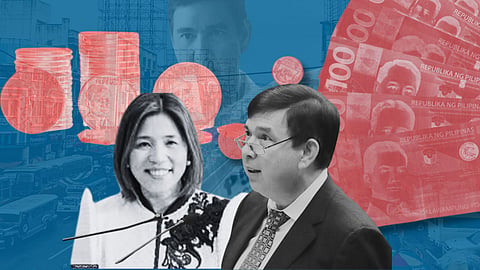
- NEWS
- the EDIT
- COMMENTARY
- BUSINESS
- LIFE
- SHOW
- ACTION
- GLOBAL GOALS
- SNAPS
- DYARYO TIRADA
- MORE

The Bureau of the Treasury (BTr) reported a P67.3 billion budget surplus in April – an encouraging figure at first glance. But a closer look reveals a troubling fiscal trend: the national government has already racked up a staggering P411.5 billion deficit just four months into 2025, raising serious concerns about how public funds are being managed under the Marcos Jr. administration.
While tax revenues in April surged by 7.84 percent year-on-year, helping deliver the surplus, this achievement is overshadowed by a near 79 percent spike in the year-to-date deficit compared to the same period last year. The root cause? A 13.57 percent expansion in government spending, much of it justified under the banner of "economic recovery" and "priority programs."
Observers may find it increasingly difficult to reconcile these growing deficits with the administration’s promises of fiscal discipline. Critics question whether the increased spending is genuinely going toward essential services and development programs – or whether the funds are being drained by inefficiencies and padded budgets.
Further fueling skepticism is the recent controversy surrounding the 2025 General Appropriations Act (GAA). Former President Rodrigo Duterte publicly criticized the presence of “blank” line items in the bicameral conference committee report, likening them to a “blank cheque” handed to the executive branch.
While Budget Secretary Amenah Pangandaman clarified that these unspecified provisions did not make it into the final version signed by President Marcos, the incident has raised alarms about transparency in the budget process. Pangandaman insists that allocations were clearly detailed in the enacted GAA and that adjustments can be made via augmentation, savings, and the President’s contingent fund. But the fact remains: such oversights, even at the bicam level, should not be taken lightly.
Total revenue collections for April amounted to P522.1 billion, down slightly by 2.82 percent due to a dip in non-tax income. Expenditures, however, fell more sharply to P454.8 billion, thanks in part to a significant 31.2 percent drop in interest payments. But the reprieve was temporary.
From January to April, revenue collection reached P1.5 trillion, up a modest 3.35 percent year-on-year. Yet even with better tax collection – led by the Bureau of Internal Revenue’s (BIR) double-digit gains – the government’s insatiable spending appetite continues to widen the fiscal gap.
The BIR posted a strong P420.5 billion in April, driven by collections from corporate and personal income taxes, and VAT – results partly attributed to crackdowns on fake receipts and the push for digital filing. However, critics argue these aggressive tax drives disproportionately burden small businesses and individual taxpayers, while large-scale tax evaders remain unscathed.
Meanwhile, the Bureau of Customs (BOC) reported a drop in April collections, citing fewer working days and weakened global trade. Yet, despite this excuse, some industry players have raised concerns about lingering inefficiencies and bureaucratic red tape that continue to plague the agency.
Non-tax revenues were a major disappointment, plummeting by 68.08 percent year-on-year in April to just P24.1 billion. This collapse, blamed on delayed remittances from GOCCs, raises deeper questions about transparency and fiscal planning. If the government is counting on these remittances, why were they not collected on time?
President Marcos has repeatedly expressed confidence in his so-called "economic dream team" – retaining Budget Secretary Pangandaman and Finance Secretary Recto while asking for courtesy resignations from all Cabinet members on 22 May. Only two of the 52 submitted resignations were accepted, signaling that the President is keeping faith in his economic managers despite mounting fiscal and political pressure.
But not everyone is convinced. In an interview with DAILY TRIBUNE’s digital show Usapang OFW, Professor Dennis Coronacion, head of the Political Science Department at the University of Santo Tomas, warned that the economic team may soon be in the crosshairs.
“Our economy is in deep trouble – inflation, unemployment. I believe this will eventually hit the President’s economic team,” Coronacion said.
“We're seeing negative trends. And if there are any casualties in this administration, I think it should be the economic managers.”
While Malacañang remains bullish on hitting its full-year fiscal targets, the growing deficit paints a different picture – one that suggests the need for more scrutiny, better planning, and perhaps a more honest conversation about where the money is going and who is ultimately benefiting from the spending spree.
